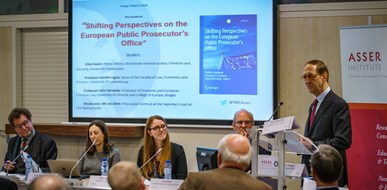Looking back at the Book launch: Shifting Perspectives on the European Public Prosecutor’s Office
Published 9 April 2018
On 9 March 2018, the T.M.C. Asser Instituut organised a book launch event for Shifting Perspectives on the European Public Prosecutor’s Office, a volume providing in-depth analyses on the Council Regulation (EU) 2017/1939 implementing enhanced cooperation on the establishment of the European Public Prosecutor’s Office (‘the EPPO’), published by the T.M.C. Asser Press. The volume was edited by Dr Willem Geelhoed (Assistant Professor, University of Groningen), Drs. Leendert Erkelens (Visiting Research Fellow, T.M.C. Asser Instituut), and Prof. Arjen Meij (Visiting Research Fellow, T.M.C. Asser Instituut) and comprises contributions written by well-known experts and practitioners in the field of European Union (EU) criminal law.
Co-editors Drs. Leendert Erkelens and Prof. Arjen Meij opened the book launch event. They drew a link between this event and the two previous conferences on EPPO organised by Asser in 2013 and 2016, respectively, and highlighted the emphasis of this event on new developments in the functioning of EPPO as well as its relations with other EU agencies and Member States. Then they introduced the panellists and the event’s moderator, Mr. Jos Silvis (Procurator-General, Supreme Court of the Netherlands).
Ms. Elisa Sason, Policy Officer, Directorate-General Justice, Freedom and Security, European Commission, provided an overview of the key components of the regulation as well as the progress of establishing EPPO from the perspective of the European Commission. She also offered insight into the progress of setting up the office. So far, 20 Member States have committed to joining the EPPO enhanced cooperation and the Netherlands is discussing its own participation.
Prof. Katalin Ligeti, Dean of the Faculty of Law, Economics and Finance, Professor of European and International Criminal Law, University of Luxembourg, delivered a presentation on Institutional Design of EPPO and Its Relations with Other EU Criminal Justice Actors through which she examined the structure and the role of EPPO from an academic perspective. She recognised EPPO’s essential role in improving the fight against EU fraud and its symbolic meaning in the EU’s progress towards supra-nationalisation.
Finally, Prof. John Vervaele, Professor of Economic and European Criminal Law, University of Utrecht and College of Europe, Bruges, built on the previous presentation and discussed EPPO’s material scope of competence as well as its powers and the essential procedural provisions. To him, EPPO operates in the jurisdiction of individual Member States, instead of a single legal area. This poses many problems as the sanction systems of the EU Member States are only partially harmonised. To illustrate this, he used the different approaches to legal persons of the Netherlands, Italy, and Germany as an example. In his perspective, while it is clear that EPPO has to abide by the EU Charter on Fundamental Rights and the directives on harmonisation, procedural safeguards are embedded in national jurisdictions and harmonisation is far from sufficient. The Parties in a case, the EPPO, and the national authorities have to deal with many different regimes. Opportunities for regime shopping hence arise.
Following the engaging and thought-provoking panels, Mr. Frank Bakker, Publisher at T.M.C. Asser Press, presented the book Shifting Perspectives on the European Public Prosecutor’s Office. He commended the cooperative spirit and mutual trust displayed by the editors in the process of publishing the book and congratulated them on this very topical publication. He then invited the editors to come forward and handed the first four books to them, which were subsequently handed to the panellists as a gift. All the attendants and panellists were then invited to a reception that marked the special moment for both Prof. Meij and Drs. Erkelens, as the day also witnessed their departure from the T.M.C. Asser Instituut as visiting research fellows.
Read the full report here.
